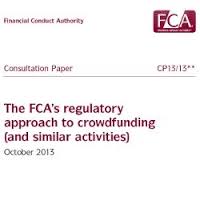 The FCA will soon announce their regulations for equity crowd funding, peer to peer lending and the electronic marketing of securities and investments. What changes can the market expect and how will it impact existing platforms and new entrants?
The FCA will soon announce their regulations for equity crowd funding, peer to peer lending and the electronic marketing of securities and investments. What changes can the market expect and how will it impact existing platforms and new entrants?
The FCA proposes the following four key changes:
- To limit the direct offer financial promotion of unlisted shares or debt securities (including websites) by firms to one or more of the following types of retail client:
- Those who are self certified or self certify as sophisticated investors. Those who are certified as high net worth investors.
- Those who confirm that, in relation to the investment promoted, they will receive regulated investment advice or investment management services from an authorised person (i.e. firms will have to engage with financial advisers).
- Those who certify that they will not invest more than 10% of their net investment portfolio in unlisted shares or unlisted debt securities (excluding their primary residence, pensions and life cover). Where advice is not provided, firms must conduct an appropriateness test before selling clients promotions for unlisted equity or debt securities.
- The same criteria used for unregulated collective investment schemes will be brought in. Where crowdfunding platforms allow investment in units in unregulated collective investment schemes the existing marketing restrictions will apply.
- The FCA warns that although certain platforms will simply serve as an introduction to an investment, where they provide a star rating or award or other incentive system, they will need to consider whether they are advising, in which case they will need to apply for FCA permission.
- Investment-based crowdfunding: the FCA proposes limits on the ability of firms to promote these platforms and a requirement that, where no advice has been provided, firms check that customers understand the risks involved.
This is in direct reference to fears, the FCA have, that platforms will market their investments to vulnerable investors. As outlined above, they are trying to widen the investment pool as wide as possible. What they are hinting at here are the hurdles that the crowd funding sites will have to put in place to ensure full disclosure of information by the platform takes place and that full understanding is assessed.
In discussions with the FCA, Sapphire Capital's legal advisors have indicated that the FCA will watch closely how the equity crowd funding sites behave. The transparent nature of these investments and sites means they can see and act very quickly when they believe the rules are being broken, and shut things down.
It is therefore crucial that those planning to start a crowd funding platform or raise money on one take the right advice. At Sapphire Capital Partners LLP we see crowd funding, combined with EIS and SEIS, as being an effective way to attract investors with the tax benefits and provide reassurance that the investment has been properly structured and approved.
Please feel free to get in touch for more information - michael@sapphirecapitalpartners.co.uk
Read our other blog articles relating to crowdfunding such as: The top ten crowd funding fundamentals

